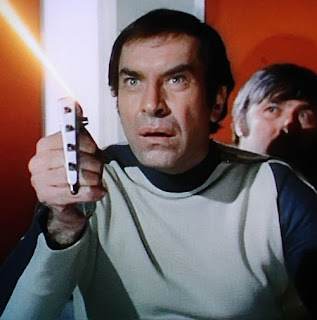It was the night of April 4, 1968, and George A. Romero was driving to New York City from Pittsburgh on a mission: In the days to come he was to meet with film studios in hopes that one might buy the horror film he was lugging in his trunk, “Night of the Flesh Eaters.”
None of the studios was interested, but Romero still managed to get his $114,000 film in front of audiences that year. And though critics panned the picture, retitled “Night of the Living Dead,” moviegoers were mesmerized — packing theaters, hitting the drive-ins in droves and making Romero the father of the modern movie zombie. Romero’s “Living Dead” franchise went on to create a subgenre of horror movie whose influence across the decades has endured, seen in movies like “The Purge” and TV shows like “The Walking Dead.”
Romero died Sunday in his sleep after a “brief but aggressive battle with lung cancer,” according to a family statement to The Times provided by his longtime producing partner, Peter Grunwald. He was 77.As the article points out, "Night of the Living Dead" went on to gross $50 million. While Romero was an American success story, his impact on our culture cannot be overstated. Prior to Romero's movies, zombies were an insignificant blip, even within the horror/monster movie genre. Today, we even have A-list stars like Brad Pitt making zombie films like "World War Z".
On top of this, we can add zombies to the pantheon of monsters like vampires and werewolves.
It was Romero who touched on that one fear we all have. Next time you walk through a graveyard, you know you will imagine a rotting, flesh-covered hand reaching out from the ground of one of the graves, or perhaps a corpse stepping out from behind a tree and walking towards you to do unspeakable things. You can thank Romero for that image.
In news of another loss...
Los Angeles Times:
Martin Landau, the Oscar-winning veteran who appeared in classic films such as Alfred Hitchcock’s “North By Northwest” and starred in the “Mission: Impossible” television series in the 1960s, has died. He was 89.
Landau died Saturday at UCLA Medical Center, where he experienced “unexpected complications” during a short hospitalization, his publicist confirmed.For me, I will always remember Martin Landau for "Space: 1999", which aired during television's science fiction dark ages from 1975-1977. As a young science fiction fan, this was the period where there were no first-run tv shows available, except for "Space:1999". "Star Trek" re-runs were about it, and "Battlestar Galactica" didn't start until 1978 (in response to the movie success of "Star Wars").
It wasn't until years later that I saw him in Alfred Hitchcock's "North by Northwest", which was surprising to me. Having been used to his "Space: 1999" role as Commander John Koenig, to see him playing a villain was a shock, although a pleasant one as he did the role perfectly, and really added to the conflict in the film. A good villain always makes a move better.
In other news...
Washington Times:
Carl Bernstein depicted the contentious nature of politics as being in the middle of a "cold civil war" as President Trump pushes back against what he calls "fake news" and various news outlets are perceived as espousing different "truths."Watch out for that phrase, "cold civil war". That may be the most apt description of our current political climate.
Appearing on CNN's "Reliable Sources" on Sunday, alongside Leonard Downie, former executive editor and vice president of the Washington Post, Bernstein compared the current media climate to that of the Watergate era. He stressed the importance of anonymous sources and said "quote 'leaks' which really are not leaks" are instead "mostly reporters trying very hard to get truthful information and put some context to this story."
...Bernstein said one of the big difference between Watergate and now is "that we are in the midst of a cold civil war in this country."
He expanded on that idea, saying that there is a political and cultural civil war and all of our reporting is taking place in the context of that cold civil war. And nothing quite like that existed at the time of Watergate."
Part of the "cold civil war," Berstein added, can be pinned on the "configuration of media with Fox News, with CNN being perceived by different sets of viewers as representing different truths." Singling out Fox News, he said the right-leaning cable news channel has "changed American politics as perhaps no other institution has."
Not all of his critique focused solely on specific networks, but on cable news in general, which he described as a "hothouse of political debate in which fact-base debate is becoming impossible in this culture."



No comments:
Post a Comment